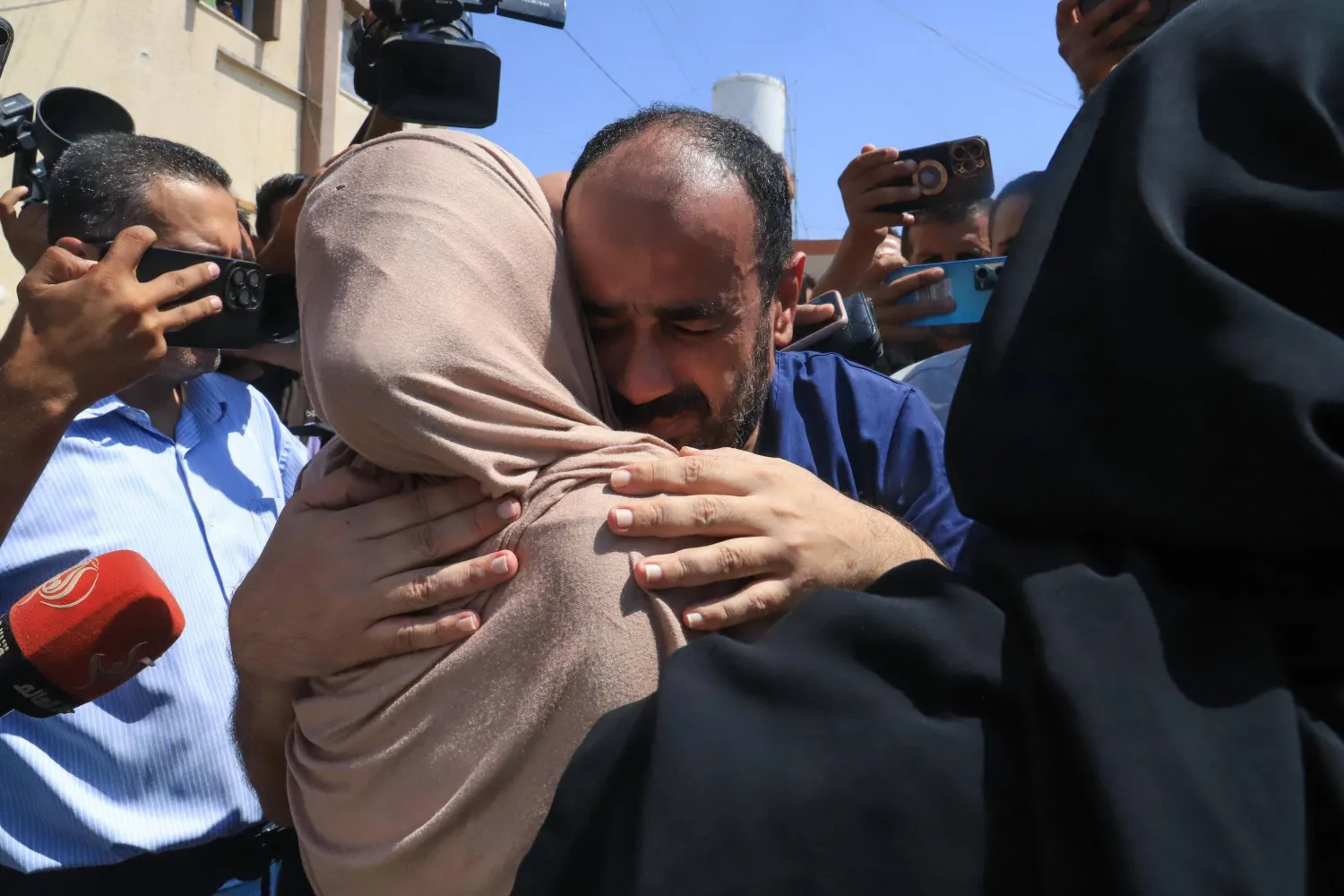Blindfolded, beaten and sometimes bitten by dogs, Gazans released from Israeli prisons allege being tortured amid the Israel-Hamas war, which rights groups say has worsened conditions for detainees.
Mohammed Abu Salmiya, former director of Al-Shifa, Gaza's biggest hospital, is the latest to report mistreatment by Israel, Reuters said.
Salmiya, one among dozens of detainees freed Monday, said "several inmates died in interrogation centers and were deprived of food and medicine."
Israel's army and Shin Bet intelligence service have not responded to his account, though they have rejected past accusations.
While the United Nations and others have long raised concerns about conditions for Palestinian detainees in Israeli prisons, rights groups say legal changes since the Gaza war erupted have aggravated the situation.
AFP interviewed some of the 50 prisoners taken to Kamal Adwan Hospital in the Gaza Strip after their release by Israel on June 11.
"I was beaten day and night. Our eyes were blindfolded, our hands and feet shackled and they set dogs on us," Mahmud al-Zaanin, 37, recounted from his hospital bed, noting the beatings sometimes targeted his genitals.
Legs amputated
"They asked me where (Hamas leader) Yahya Sinwar was, where Hamas was, where our prisoners were, and why I participated on October 7," he said.
Zaanin said he did not take part in Hamas's October 7 attacks on Israel that led to 1,195 deaths, mostly civilians, according to an AFP tally based on Israeli figures.
Israel's retaliatory offensive has killed at least 38,011 people in Gaza, also mostly civilians, according to the health ministry in the Hamas-run territory.
Zaanin said he was deprived of sleep and bathroom access and denied medical treatment. "We urinated in our clothes."
Released inmate Othman al-Kafarneh told AFP his "hands were injured from electric torture" and described prisoners being blindfolded and moved, never knowing their locations.
Kafarneh said he saw "more than 30 prisoners with amputated legs, some with both legs missing, and some with both eyes missing."
In April, the Haaretz newspaper quoted a letter to Israel's defense ministry from a doctor at an Israeli army camp.
"Prisoners from Gaza have had their legs amputated due to the effects of shackles, they defecate in diapers and are continuously restrained, which violates medical ethics and the law," it said.
In May, AFP questioned released prisoners at Al-Aqsa Martyrs Hospital in Gaza, where Musa Yussef Mansur recounted, "We slept for two hours, then they brought dogs and set them on us at night".
"Some young men died from excess beatings and dog attacks," Mansur said, showing scars on his arms which he said were from dog bites.
Legal battle
The United Nations has called Israel's treatment of prisoners "unacceptable".
Ravina Shamdasani, spokesperson for the UN human rights commissioner, told AFP: "We have received reports of torture, mistreatment, handcuffing, deprivation of food, of water of medication, and these are very worrying reports.
"We have raised them directly with the Israeli authorities and we have asked for a transparent investigation."
Authorities did not respond to AFP questions.
In May, the Israeli army said it "rejects outright" allegations in a US media report of stripping, sexually abusing and electrocuting detainees during interrogations.
The army acknowledged there have been 36 deaths, attributing them to detainees who were sick or had been wounded in the war.
It said the military adheres to Israeli and international law, emphasizing that detainees released to Gaza "are under the control of a terrorist organization that can force them to provide false information".
After Hamas's attacks, Israel's parliament amended detention rules.
Changes to the Unlawful Combatants Law in December have been used to detain Palestinians in special camps, including Sde Teiman in the Negev desert where Salmiya was held.
Israel can now detain prisoners for 45 days without an administrative process, compared with 96 hours previously.
Prisoners can be held for 75 days without a court hearing, up from 14 days, and this can be extended to 180 days.
Judges can prevent a detainee from contacting a lawyer.
"Some detainees have not been visited by a lawyer for more than eight months and are being tried via Zoom without being brought to court and without lawyers," said Tal Steiner, director of the Public Committee Against Torture in Israel.
Steiner's group knew of three camps where detainees were shackled 24 hours a day in open cages.
"We believe in the law to help change these violations, so we have filed a petition," said Steiner.
The government has not issued a formal response.
A state attorney told a supreme court hearing in May, however, that there were 2,000 Gazan detainees classified as "unlawful combatants" under permanent detention orders, meaning they have been held for over 45 days.
Hundreds are awaiting indictment, the attorney added, while more than 1,500 have been released and returned to Gaza.
Released Gaza Detainees Say they Were Tortured by Israel

Former Gaza hospital director Mohammed Abu Salmiya is among the Palestinian detainees who say they were 'tortured' in Israeli prisons. Bashar TALEB / AFP

Released Gaza Detainees Say they Were Tortured by Israel

Former Gaza hospital director Mohammed Abu Salmiya is among the Palestinian detainees who say they were 'tortured' in Israeli prisons. Bashar TALEB / AFP
لم تشترك بعد
انشئ حساباً خاصاً بك لتحصل على أخبار مخصصة لك ولتتمتع بخاصية حفظ المقالات وتتلقى نشراتنا البريدية المتنوعة







